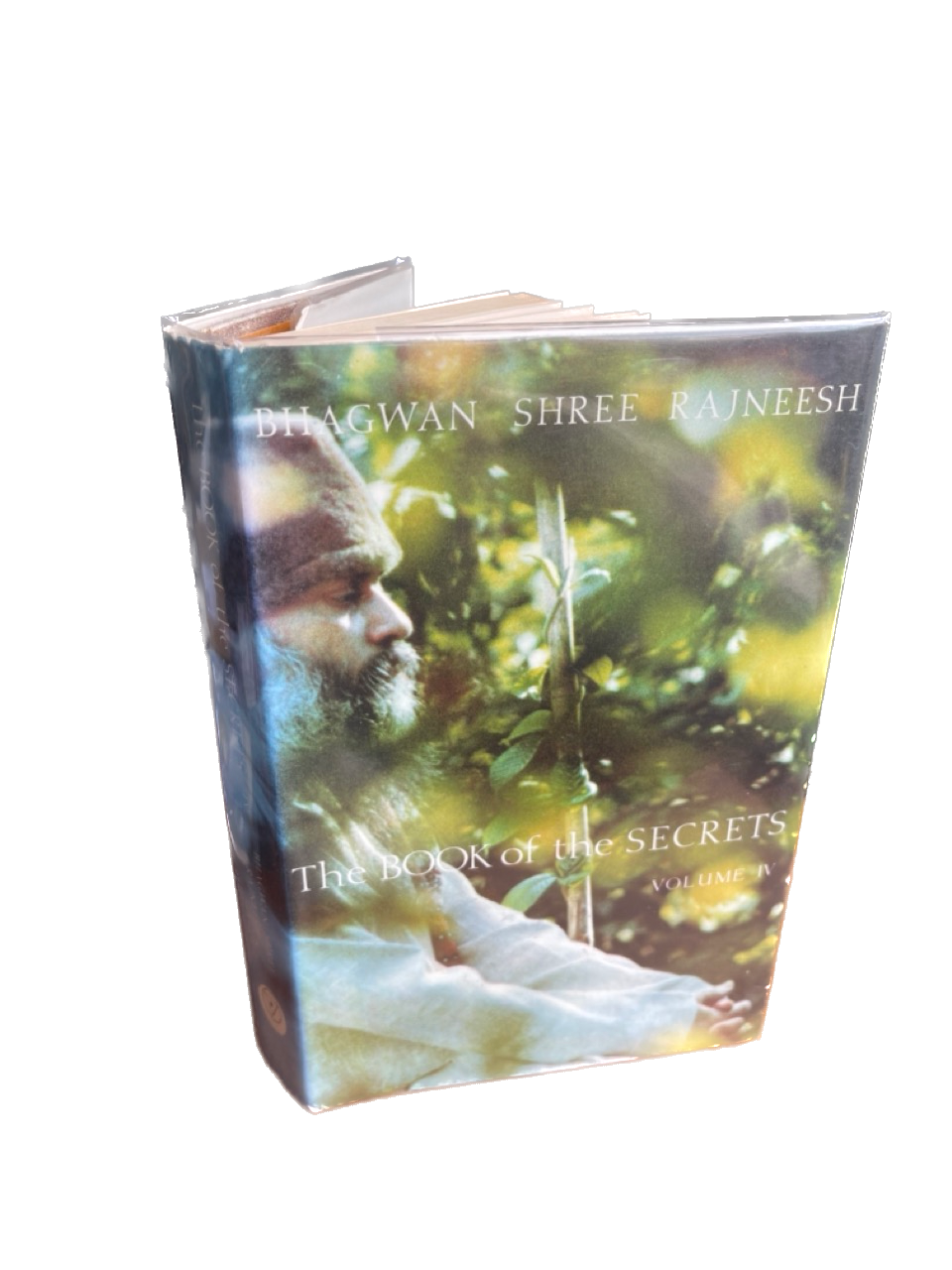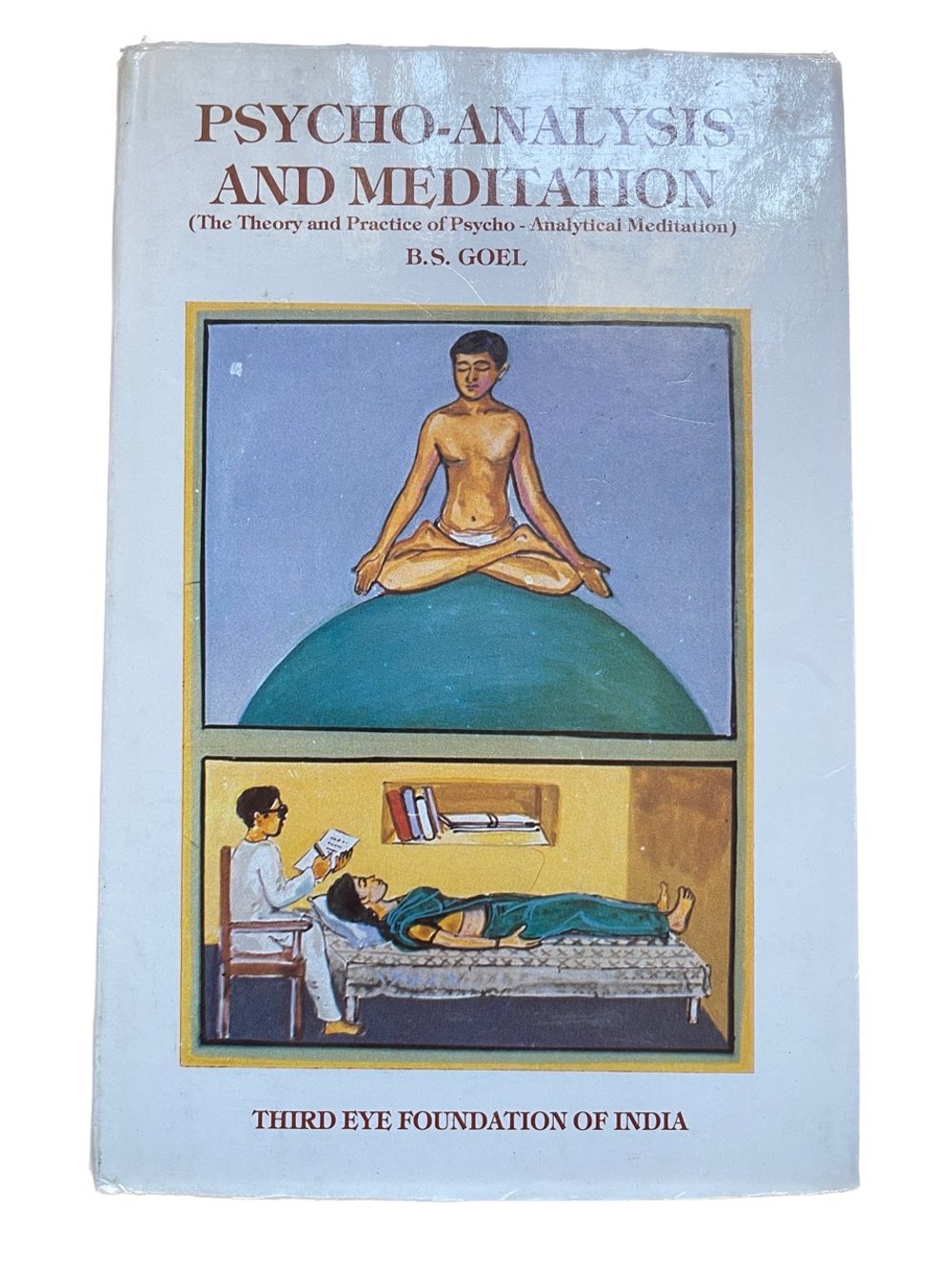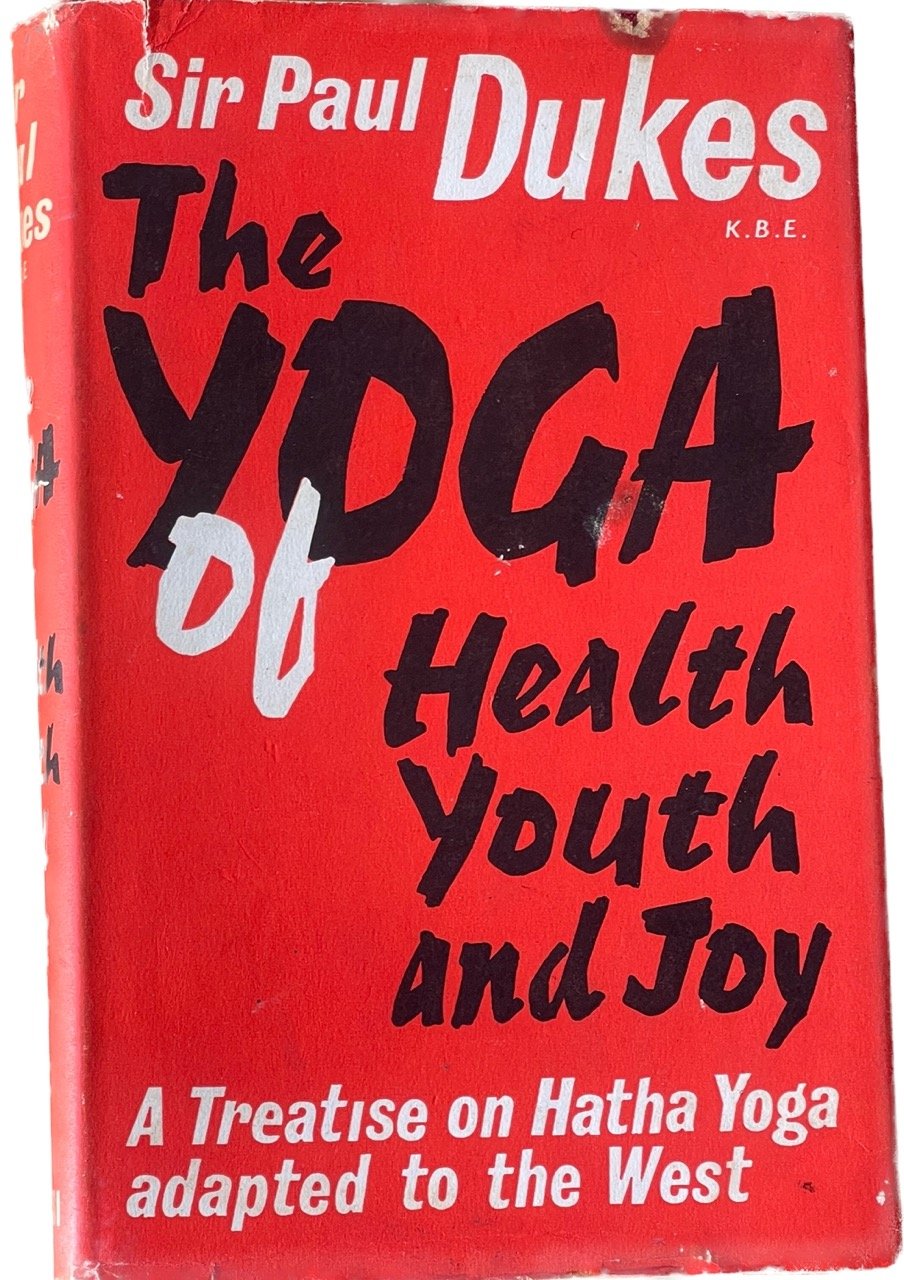 Image 1 of 3
Image 1 of 3

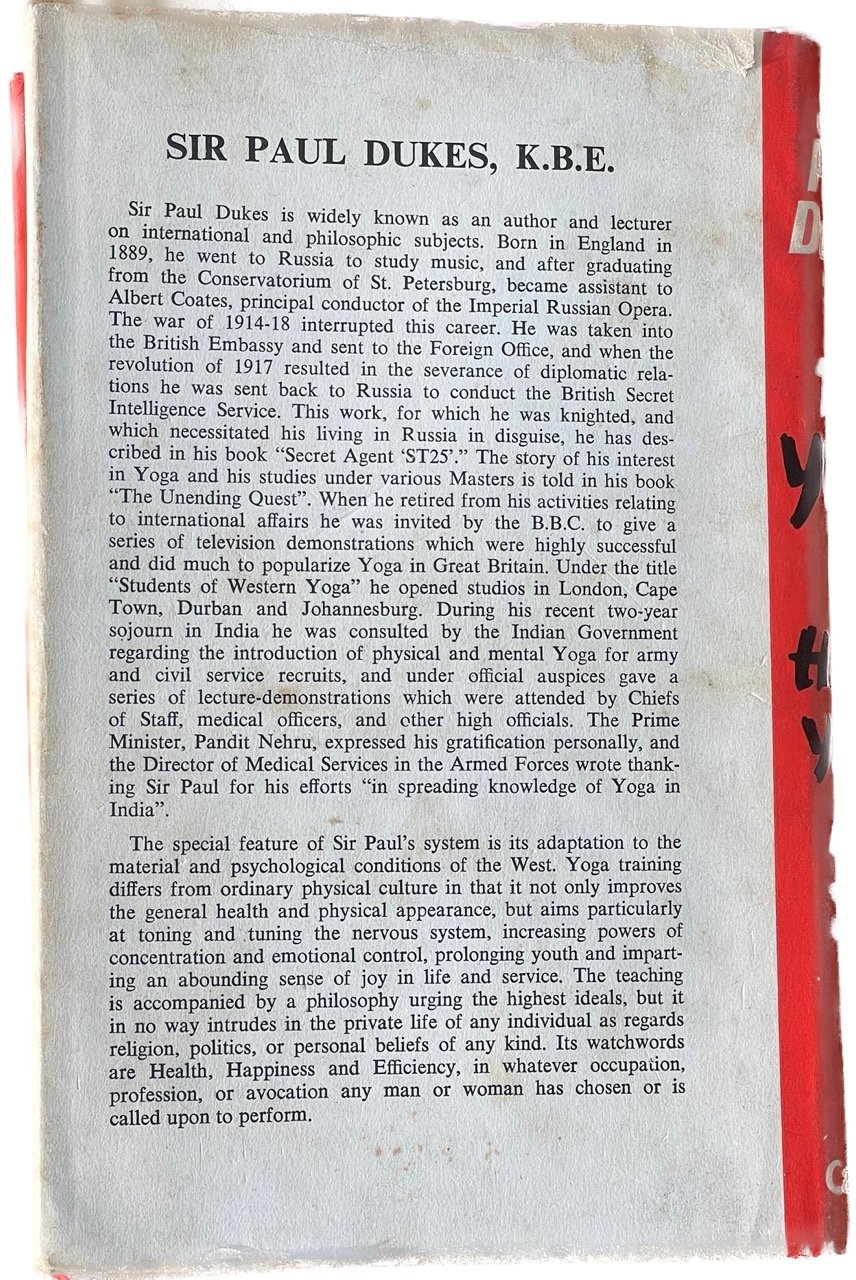 Image 2 of 3
Image 2 of 3

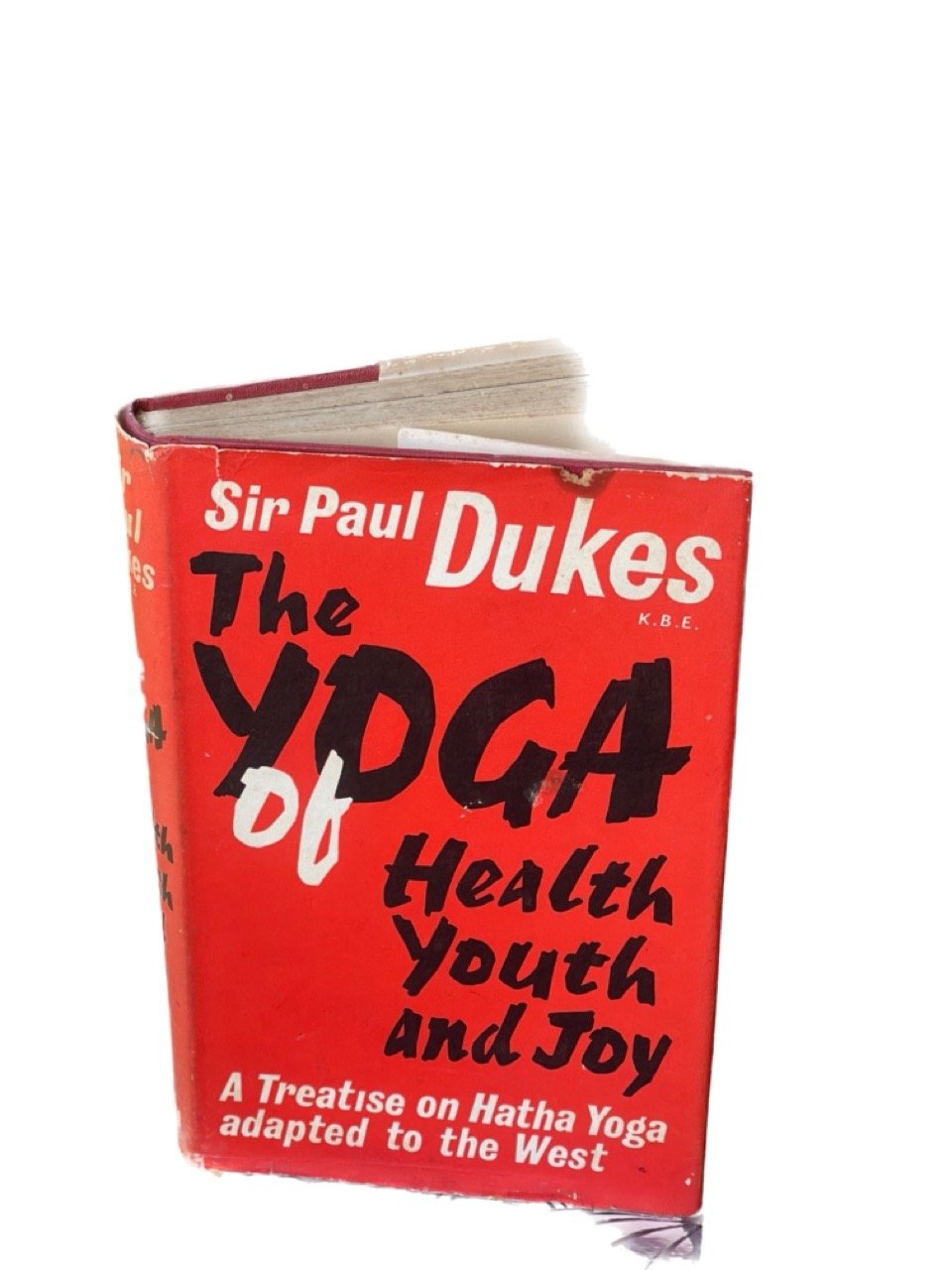 Image 3 of 3
Image 3 of 3




The Yoga of Health Youth and Joy
A Treatise on Hatha Yoga adapted to the West
By Sir Paul Duke K. B. E
Sir Paul Dukes is widely known as an author and lecturer on international and philosophic subjects. Born in England in 1889, he went to Russia to study music, and after graduating from the Conservatorium of St. Petersburg, became assistant to Albert Coates, principal conductor of the Imperial Russian Opera.
The war of 1914-18 interrupted this career. He was taken into the British Embassy and sent to the Foreign Office, and when the revolution of 1917 resulted in the severance of diplomatic relations he was sent back to Russia to conduct the British Secret Intelligence Service. This work, for which he was knighted, and which necessitated his living in Russia in disguise, he has described in his book "Secret Agent ‘ST25’." The story of his interest in Yoga and his studies under various Masters is told in his book "The Unending Quest. When he retired from his activities relating to international affairs he was invited by the B.B.C. to give a series of television demonstrations which were highly successful and did much to popularize Yoga in Great Britain. Under the title "Students of Western Yoga" he opened studios in London, Cape Town, Durban and Johannesburg. During his recent two-year sojourn in India he was consulted by the Indian Government regarding the introduction of physical and mental Yoga for army and civil service recruits, and under official auspices gave a series of lecture-demonstrations which were attended by Chiefs of Staff, medical officers, and other high officials. The Prime Minister, Pandit Nehru, expressed his gratification personally, and the Director of Medical Services in the Armed Forces wrote thanking Sir Paul for his efforts "in spreading knowledge of Yoga in India”.
The special feature of Sir Paul's system is its adaptation to the material and psychological conditions of the West. Yoga training differs from ordinary physical culture in that it not only improves the general health and physical appearance, but aims particularly at toning and tuning the nervous system, increasing powers of concentration and emotional control, prolonging youth and impart ing an abounding sense of joy in life and service. The teaching is accompanied by a philosophy urging the highest ideals, but it in no way intrudes in the private life of any individual as regards religion, politics, or personal beliefs of any kind. Its watchwords are Health, Happiness and Efficiency, in whatever occupation, profession, or avocation any man or woman has chosen or is called upon to perform.
A Treatise on Hatha Yoga adapted to the West
By Sir Paul Duke K. B. E
Sir Paul Dukes is widely known as an author and lecturer on international and philosophic subjects. Born in England in 1889, he went to Russia to study music, and after graduating from the Conservatorium of St. Petersburg, became assistant to Albert Coates, principal conductor of the Imperial Russian Opera.
The war of 1914-18 interrupted this career. He was taken into the British Embassy and sent to the Foreign Office, and when the revolution of 1917 resulted in the severance of diplomatic relations he was sent back to Russia to conduct the British Secret Intelligence Service. This work, for which he was knighted, and which necessitated his living in Russia in disguise, he has described in his book "Secret Agent ‘ST25’." The story of his interest in Yoga and his studies under various Masters is told in his book "The Unending Quest. When he retired from his activities relating to international affairs he was invited by the B.B.C. to give a series of television demonstrations which were highly successful and did much to popularize Yoga in Great Britain. Under the title "Students of Western Yoga" he opened studios in London, Cape Town, Durban and Johannesburg. During his recent two-year sojourn in India he was consulted by the Indian Government regarding the introduction of physical and mental Yoga for army and civil service recruits, and under official auspices gave a series of lecture-demonstrations which were attended by Chiefs of Staff, medical officers, and other high officials. The Prime Minister, Pandit Nehru, expressed his gratification personally, and the Director of Medical Services in the Armed Forces wrote thanking Sir Paul for his efforts "in spreading knowledge of Yoga in India”.
The special feature of Sir Paul's system is its adaptation to the material and psychological conditions of the West. Yoga training differs from ordinary physical culture in that it not only improves the general health and physical appearance, but aims particularly at toning and tuning the nervous system, increasing powers of concentration and emotional control, prolonging youth and impart ing an abounding sense of joy in life and service. The teaching is accompanied by a philosophy urging the highest ideals, but it in no way intrudes in the private life of any individual as regards religion, politics, or personal beliefs of any kind. Its watchwords are Health, Happiness and Efficiency, in whatever occupation, profession, or avocation any man or woman has chosen or is called upon to perform.
A Treatise on Hatha Yoga adapted to the West
By Sir Paul Duke K. B. E
Sir Paul Dukes is widely known as an author and lecturer on international and philosophic subjects. Born in England in 1889, he went to Russia to study music, and after graduating from the Conservatorium of St. Petersburg, became assistant to Albert Coates, principal conductor of the Imperial Russian Opera.
The war of 1914-18 interrupted this career. He was taken into the British Embassy and sent to the Foreign Office, and when the revolution of 1917 resulted in the severance of diplomatic relations he was sent back to Russia to conduct the British Secret Intelligence Service. This work, for which he was knighted, and which necessitated his living in Russia in disguise, he has described in his book "Secret Agent ‘ST25’." The story of his interest in Yoga and his studies under various Masters is told in his book "The Unending Quest. When he retired from his activities relating to international affairs he was invited by the B.B.C. to give a series of television demonstrations which were highly successful and did much to popularize Yoga in Great Britain. Under the title "Students of Western Yoga" he opened studios in London, Cape Town, Durban and Johannesburg. During his recent two-year sojourn in India he was consulted by the Indian Government regarding the introduction of physical and mental Yoga for army and civil service recruits, and under official auspices gave a series of lecture-demonstrations which were attended by Chiefs of Staff, medical officers, and other high officials. The Prime Minister, Pandit Nehru, expressed his gratification personally, and the Director of Medical Services in the Armed Forces wrote thanking Sir Paul for his efforts "in spreading knowledge of Yoga in India”.
The special feature of Sir Paul's system is its adaptation to the material and psychological conditions of the West. Yoga training differs from ordinary physical culture in that it not only improves the general health and physical appearance, but aims particularly at toning and tuning the nervous system, increasing powers of concentration and emotional control, prolonging youth and impart ing an abounding sense of joy in life and service. The teaching is accompanied by a philosophy urging the highest ideals, but it in no way intrudes in the private life of any individual as regards religion, politics, or personal beliefs of any kind. Its watchwords are Health, Happiness and Efficiency, in whatever occupation, profession, or avocation any man or woman has chosen or is called upon to perform.





